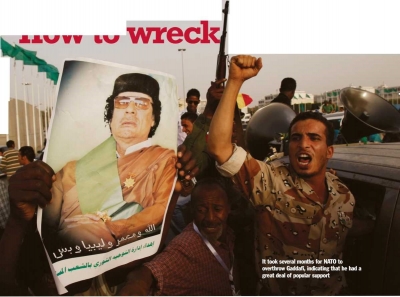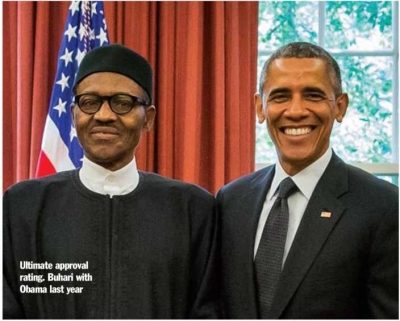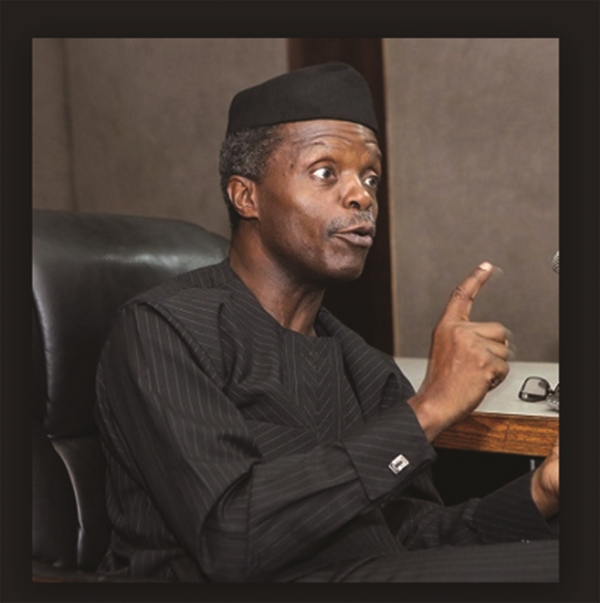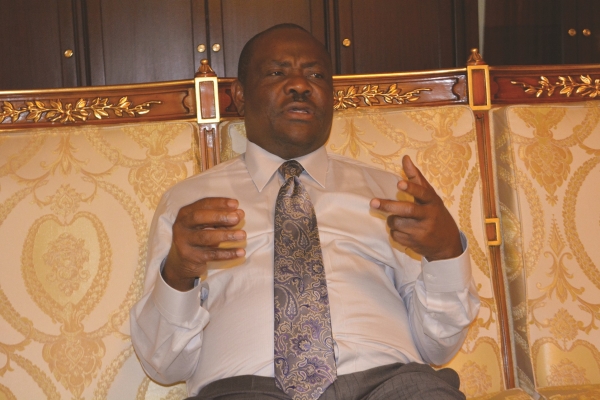How to wreck a country
How to wreck a country
By anyone’s standards, Lybia is a failed state that threatens to destabilise the rest of Africa. The blame for this lies with NATO, writes Moffat Ekoriko
US PRESIDENT Barack Obama must be gifted in euphemism. Asked about the outcome of the NATO intervention in Libya, he said it is a “mess”. The reporter who anchored the interview apparently taken aback wrote: “Mess is the president’s diplomatic term; privately, he calls Libya a ‘shot show’.”
The reality is that Libya, once one of the most stable countries in Africa with high ratings on the human development index (HDI), has become a failed state. Hell would have been a better four-letter word to describe a country with no functional government, ridden with competing armed militias and one of the three with territories held by the Islamic State. The chaos in Libya is down to the NATO military intervention in the country of 2011, which went ahead despite the protests of the African Union.
As at the time of going to press, the government of national unity formed at the instance of the United Nations in January was still based in neighbouring Tunisia. It was meant to end the feud between two rival administrations, one based in Tripoli and the other in the eastern town of Tobruk. The new government, made of 32 cabinet members, was the culmination of a UN- backed peace process. A nine member presidential council was set up and tasked with the mandate of appointing the new administration. On the surface of it, this new government should work. It has representatives from the two rival parliaments. Fayez Sarraj, a politician from the east will serve as the prime minister. Al-Aref al-Khoga, former interior minister from the west, retains his portfolio in the new arrangement. Khaled Nejm from the east will be responsible for information with Mahdi al Barghathi, an army commander from the east taking charge of defence.
However, given the chaos prevalent in the country, the new government is unable to set foot in Tripoli. Reports say the planned relocation of the new unity government to Tripoli was thwarted by Khalifa Al Ghweil, the prime minister of the Tripoli-based factional government. The new government is also suffering legitimacy questions following the inability of the internationally recognised parliament based at Tobruk to pass a resolution endorsing it.
Aguila Saleh Issa, the president of the the Tobruk parliament, had called for debate to endorse the new government, March 28, but there are not enough members to form a quorum. Although the new government said late March, that the security arrangements for it to relocate to Tripoli were complete and that it was mindful of “saving Libyan blood” and therefore wanted to move there when there is guarantee of peace.
Ghweil does not appear to be thinking of that peace. A day before the announcement, he closed the airports at Tripoli and Misrata following rumours that Sarraj was going to fly into the country to assume office., leaving thousands of travellers stranded at the airport.
Even when the new government takes over, it will have to grapple with the worsening security situation in the country. Libya is now broken into fiefdoms controlled by different militia. Efforts to disarm the militia have been frustrated by the absence of a national army and a stable political authority. The government faction in Tripoli is backed by Islamist militia. What should be the national army is controlled by Khalifa Haftar, supportive of the Tobruk government but opposed to Islamists. In between the two major forces are tribal and town based militias.
To compound the security crisis, the dreaded Islamic State (IS) has made Libya its third area of operation. With forces based in around Sirte, the home town of Gaddafi, the IS forces pose a threat to any attempt to impose a nationwide order. Apart from their trademark brutality, IS forces are kidnapping people from as far afield as Tripoli and Adjabbiya. Late last month, they executed three Libyan army soldiers seized while on leave from their duty posts in Benghazi. The presence of the group has also attracted the intervention of foreign forces. US troops have carried out regular air attacks against the group (without seeking the consent of any government in Libya). So have the Egyptians and the Emirati.
As the security situation worsens, so has the economy. Oil production dropped to 396,000 barrels per day in February against peak production of 1.4 million barrels per day before the overthrow of the Gaaddafi government. The standard of living has plummeted as Libyans face shortages and spiralling cost of staple foods.
It will be an uphill task to stop Libya from falling into complete anarchy not to talk of restoring it to stability. That Libya is in such a state is down to the recklessness of the NATO for effecting regime change and failing to take responsibility for stabilising the country after that. President Obama who led the military operation to topple Gaddafi, said he had believed that the Europeans (in this case, Britain and France) would invest in the follow up. Some Middle East experts like Alan Kuperman of the Texas University at Austin think the present crisis in Libya was totally avoidable since NATO had no real reason to intervene.
So what went wrong? Towards the end of 2010, the Arab Street was very restive. A revolt had dramatically sacked the governments in neighbouring Tunisia and Egypt. The success of the protesters had started what was called the Arab Spring. The once impregnable autocrats of the Mddle East, not least Muammar Gaddafi, were looking vulnerable.
In February 2011, following the arrest of a lawyer representing the families of 1,200 people who died in prison, protests broke out in Benghazi, Libya’s second largest city and later spread to other urban areas. The security forces batded to contain the unrest, which were becoming increasingly violent. By the middle of March 2011, the protests had turned into a full blown rebellion but much of Libya lies bi ruins following NATO’s disastrous intervention the rebels were no match for Gaddafi’s forces. One city after the other, the security forces established order, save for Benghazi, which had become the de facto epicentre of the rebellion. It is at this point that foreign forces stepped in, claiming that Gaddafi was planning to massacre his own people there.
Countries that had axes to grind with him quickly rallied round the rebels, investing their political and diplomatic capital to win them legitimacy. Media from the west and Gulf countries quickly swung behind the narrative. Aljazeera’s false report that Gaddafi’s air force was strafing and bombing civilians in Benghazi was seized upon by those pushing for a no-fly zone. The Saudi- owned channel Al Arabiya reported falsely that the death toll from the clashes was 10,000. Human Rights Watch documented only 233.
Sections of the rebel leadership, much of which had been courted by the CIA for years, were emboldened. The height of this support was a Linited Nations Security Council resolution, which was obtained under the guise of preventing a massacre of civilians by regime forces. The UN Resolution 1973 (passed March 17, 2011) imposed a no-fly zone over Libya and authorised the use of all necessary means, save an occupation, to protect civilians. This supposed humanitarian intervention was a follow up to the sanctions and embargoes earlier imposed on the country three weeks before then.
Unknown to many, including the Russians who abstained, the trio of the US, Britain and France secretly had regime change at the top of their agenda. Within 24 hours of that resolution, NATO forces attacked Libya. Targets of air strikes included members of the government. With such an advanced air force at their disposal, the rebels became hostile to all efforts at achieving a political resolution.
One of such efforts that was rebuffed by the rebels came from the African Union. After its opposition to military intervention was ignored, the AU came up with a peace plan. The plan was spearheaded by a high powered committee led by President Jacob Zuma of South Africa. Other members of the committee were presidents Mohammed Abdel Aziz of Mauritania, Amadou Toure of Mali, Dennis Sassou Nguesso of Congo Brazaville and Yoweri Museveni of Llganda.
Under the plan, there was to be an immediate ceasefire, unhindered delivery of humanitarian aid, protection of foreign nationals, dialogue between the government and rebels on a political setdement and the suspension of NATO air strikes. The embattled Gaddafi, after meeting with Zuma and three other heads of state plus the foreign minister of Uganda in Tripoli, readily accepted the roadmap. But with NATO behind them, the rebels binned the plan. They insisted there would be no peace until Gaddafi and his sons stood down. NATO was equally dismissive.
What was most shocking was the approach of the western media. According to the BBC in its report of the peace plan: “The situation is muddied by money. Col Gaddafi has bankrolled the AU for years and he has bought friends in Africa.” Translation: the AU has been bought by Gaddafi.
Nothing could be farther from the truth. The funding of the AU is through the contribution of all member states and the ratio is pre-determined based on the financial capability of individual countries. Libya’s contributions would have been based on the agreed parameters. Even then, it would not have been more than the contributions of Nigeria, South Africa and Egypt. Besides, such funding would be by Libya as a member state and not Gaddafi as an individual.
Even with the rebuff from the rebels and insults by the media, the AU did not give up. Zuma made a further trip to Tripoli six weeks later but NATO was in no mood to stop despite further concessions by Gaddafi. Contrary to the perception in the west, the AU dreaded the consequences of Gaddafi’s forced exit from power. There were three dangers: One, Libya could become a failed state. The tribal and ethnic mix of Libya was such that the forced removal of the government would make it difficult to build a political consensus for post- Gaddafi stability. Having lived with consequences of Somalia, African countries knew the cost of having a failed state in the region.
Two, Libya had a huge arms arsenal, which would be difficult to secure in such a vast country. AU felt that these arms would spread all over the region. Three, there were other Africans in the Libyan Army who would return home with military skills to pose a destabilising risk to their home countries. Four, among the rebels were Islamists and terrorists and the AU feared the consequences of giving them a safe haven in an post-Gaddafi Libya. Gaddafi, himself, in a tearful letter to Obama, begged NATO to back off so that Libyans could decide its future “within the African Union frame”.
Africa is paying a high cost for NATO’s arrogance. The arms looted from Libya has found its way to armed insurgents in many different parts of the continent. The country itself has become a haven for terrorists, threatening the spread of IS. President Obama thinks the problem with Libya is that NATO did not enter the country with a force strong enough to rebuild Libya after the war.
Kuperman thinks the president is wrong. “The error in Libya was not an inadequate intervention effort, but the decision to intervene in the first place. The AU is vindicated.”
Read more »





